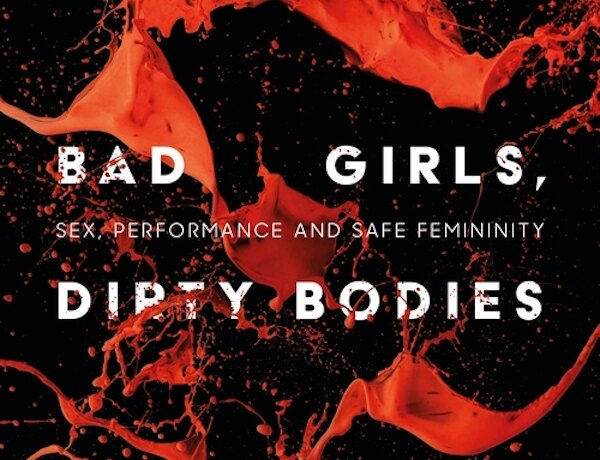
Dangerous Feminities by Gemma Commane
This blog post is part of the Voice and Listening: Techniques for political life event.
Generally, ‘Dangerous Femininities’ (the ‘bad’, the dirty, the distasteful, the freaky) include those who fail the socially approved standard of ‘clean’ and ‘safe’ femininity (i.e. ‘failures’ include women who take up too much space and shout back, careers such as sex work, bisexuals and queers, trans women, and kinky folk). The socially constructed standard of clean femininity is usually framed around hetero-sexist and misogynistic assumptions. There is nothing weak about women, especially women who defy wider social norms that try to dampen their power, experience and voice.
Dangerous Femininities are not ‘damaged goods’, they are not there for your approval, and they are not stupid. Unapologetically, they take up meaningful space and offer new ways to embody possibilities (i.e. gendered, sexual, social, cultural, etc. possibilities – see Commane 2020).
You are part of the problem if you cannot see the value of Dangerous Femininities. If you actively ignore and not activity listen to their voices, experiences and expertise; then you are continuing and giving validation to gendered violence.
To give wider context: the bad, dangerous and dirty unfortunately still operate as words that can be used to devalue, censor and take away agency and voices of women who choose careers, lifestyles or sexual identities that are not considered ‘normal’. Paradoxically, consumer culture flirts with the bad, dangerous and dirty, but only in temporary ways, leaving those who continue to be ‘bad women’ (or Dangerous Femininities) often subject to discrimination from loved ones and institutions like the police and social services, legal and moral degradation, and violence (i.e. physical violence, victims of doxing, and social media bans, to name but a few).
Before exploring an example of the value of Dangerous Femininities and voice, it is important to consider the following questions when asked ‘who has voice’:
- Who is heard and listened to in meaningful ways?
- Who is listening to these specific voices and in what contexts? For example, is voice seriously listened to within the usual networks that groups and/or individuals navigate, or do ‘valid voices’ emanate beyond the usual supportive networks, into spaces like pop/dominant culture?
- Who is not listening? For what reasons?
- Who wants to be heard and by who?
- When is listening to voice most important? Are there certain spaces, times, events, gatherings which need to locate marginal voices front and centre? Would interventions of voice be planned or spontaneous?
- What does action have to do with voice?
In regards to the context of my research, I am focusing on the voices of Pro-Dommes and their enterprises. They can be classed as ‘Dangerous Femininities’ due to their expertise and craft of Domination. This is not a negative label in the context of my research, but part of a framework that locates certain individuals – whose gender, sexuality, job and expertise – defy puritanical discourses that hold women back (Commane 2020). The Professional Dominatrix is an entrepreneur, but this framework is still not recognised in wider culture and their craft is not readily included in discussions of entrepreneurship, despite some amazing work bringing women’s voices front and centre of research (see Patel, 2017, Naudin 2018, Duffy and Hund 2015, Loaker 2013). This absence illuminates whose voice ‘matters’ through the exclusion of women who are not considered researchable or important enough to be listened to.
Exploring identity, exclusion and marginalisation through the framework of entrepreneurship in relation to Pro-Domme voice and work, is an important intervention into a variety of absences. We shouldn’t really need a framework that validates work, when other forms of labour and expertise are valued, listened to and not questioned. Frames can attempt to ‘validate’ and give ‘authenticity’ to types of work that wider society and large parts of academia reject, make fun of, and dismiss. However, in the implementation of this framework, would this mean that ‘new’ voices will be automatically listened to, just like cis vanilla folk (i.e. mainly white, middle class, able bodied, straight men)?
To hear voices in meaningful ways, means that we need to listen to the voices of Pro-Dommes. To hear voice in meaningful ways means we need to see Pro-Dommes as experts who we can learn from and collaborate with. This potential space of radical learning, which is drawn from their negotiations of femininity, work and space; may help deepen our understanding of contemporary attitudes towards women.
To end this position statement, there is one more thing to reflect on. Do you practice what you preach, or do you only listen to the ‘voices’ of the communities you research during ‘worktime’ and in your publications? We might make room in research for voice, but making room and listening also involves you thinking about other ways to collaborate and disseminate ‘voice’ in spaces beyond academia. This means thinking about who actually benefits from voice, but also how do you make sure that collaborative research focusing on voice doesn’t feed back into the same systems of oppression.
